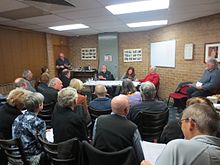
| This article is part of a series on |
| Libertarianism in the United States |
|---|
 |
A voluntary group or union (also sometimes called a voluntary organization, common-interest association,[1]: 266 association, or society) is a group of individuals who enter into an agreement, usually as volunteers, to form a body (or organization) to accomplish a purpose.[2] Common examples include trade associations, trade unions, learned societies, professional associations, and environmental groups.
All such associations reflect freedom of association in ultimate terms (members may choose whether to join or leave), although membership is not necessarily voluntary in the sense that one's employment may effectively require it via occupational closure. For example, in order for particular associations to function effectively, they might need to be mandatory or at least strongly encouraged, as is true of trade unions. Because of this, some people prefer the term common-interest association to describe groups which form out of a common interest, although this term is not widely used or understood.[1]
Voluntary associations may be incorporated or unincorporated; for example, in the US, unions gained additional powers by incorporating.[3] In the UK, the terms voluntary association or voluntary organisation cover every type of group from a small local residents' association to large associations (often registered charities) with multimillion-pound turnover that run large-scale business operations (often providing some kind of public service as subcontractors to government departments or local authorities).[4][5]
Voluntary association is also used to refer to political reforms, especially in the context of urbanization, granting individuals greater freedoms to associate in civil society as they wished, or not at all.
- ^ a b Prins, Harald E. L.; Haviland, William A.; McBride, Bunny; Walrath, Dana (2010). Cultural Anthropology: The Human Challenge. Cengage Learning. ISBN 978-0-495-81082-7.
- ^ "association". Dictionary.com Unabridged (Online). n.d.
- ^ Bradburn, Douglas (2009). The Citizenship Revolution: Politics and the Creation of the American Union, 1774–1804. University of Virginia Press. p. 217. ISBN 978-0-8139-3031-2.
- ^ Brooks, Ruth (13 February 2023). "What is the voluntary sector?". University of York. Retrieved 7 November 2023.
- ^ "How do we define the voluntary sector?". The National Council for Voluntary Organisations. 1 September 2021. Retrieved 7 November 2023.